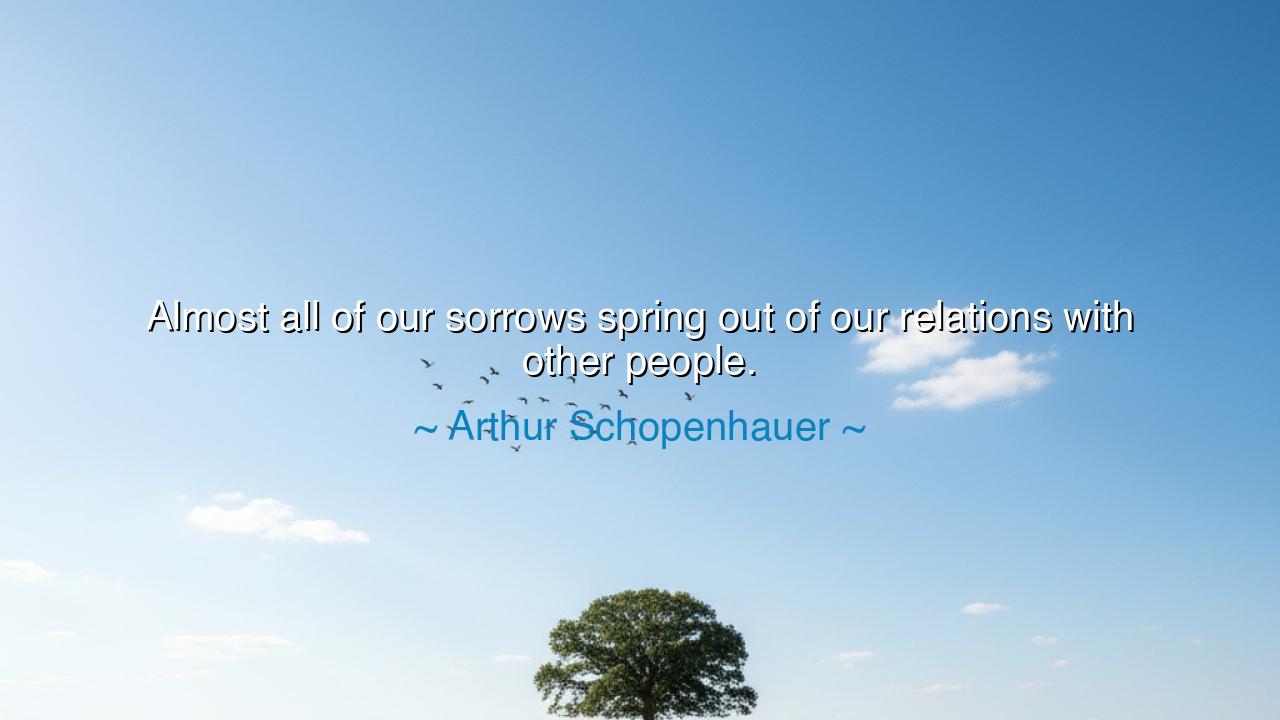
Almost all of our sorrows spring out of our relations with other






Arthur Schopenhauer, the brooding philosopher of will and fate, once declared: “Almost all of our sorrows spring out of our relations with other people.” In this piercing statement, he lays bare one of the deepest truths of the human condition — that our greatest joys are born of connection, yet so too are our deepest wounds. The solitude of the forest may bring loneliness, but it is rarely as sharp as betrayal. The hunger of the body may bring discomfort, but it is seldom as bitter as rejection. Schopenhauer’s words strike like iron: it is not fate alone that breaks us, but the hands and voices of those around us.
The ancients also knew this truth well. In the tragedies of Greece, sorrow is rarely the work of nature; it is kin against kin, friend against friend, betrayal, rivalry, envy, and pride that drive men and women to ruin. Orestes kills his mother, Antigone defies her king, Medea slays her children in vengeance. Nature’s storms are cruel, yet it is the storms of the heart, tangled in human relations, that produce the most devastating sorrows.
History gives us many mirrors of this wisdom. Consider Julius Caesar, conqueror of Gaul, master of Rome. He faced the spears of enemies and the dangers of war without flinching. Yet in the Senate, among men he called friends, he met his death. The blade that cut deepest was not the thrust of Brutus’ dagger into his flesh, but the wound of betrayal into his spirit. Here we see the truth of Schopenhauer’s words: it is not always the hostility of strangers, but the nearness of companions, that brings the greatest sorrow.
And yet, though Schopenhauer spoke with the gloom of a pessimist, there is also hidden wisdom that can be turned toward light. For if our sorrows so often spring from human relations, it is because our hearts are made to be vulnerable in love, in trust, in friendship. To feel wounded by another is proof that we were open, that we sought connection. The wound is the shadow cast by the light of relationship. In this sense, sorrow is not only pain but also the measure of our longing to belong, to be understood, to be cherished.
But we must learn to guard against folly. Many sorrows arise from pride, from envy, from the endless desire to impress or dominate others. If we live by the judgments of men, then we become their slaves. If we measure our worth only by the praise or scorn of others, then we shall always be tossed like a leaf in the wind. Here is the lesson: to love others, but not to live wholly by them; to cherish relations, but not to let them rule the soul. Balance is the path between isolation, which withers, and dependence, which chains.
Practically, this means cultivating inner strength. Reflect each day: Am I seeking approval, or am I seeking truth? When injured by others, ask yourself whether their wound reveals something to learn or merely something to endure. Do not close your heart to friendship, for that would deny your humanity, but do not entrust it so wholly that you collapse at every slight. In sorrow, learn patience; in conflict, learn humility; and in betrayal, learn discernment. Thus even the pain of human relations can be turned into wisdom.
So, O children of tomorrow, take heed of Schopenhauer’s hard saying: “Almost all of our sorrows spring out of our relations with other people.” Do not despise this truth, but understand it. For it means you are human, bound to others by ties that bless and bruise alike. Accept that to live among men is to suffer, yet also to grow. And remember: though sorrows come by the hand of others, so too do joys, comforts, and love. The burden is heavy, but it is also the crown of being human — to share this fragile, sorrowful, wondrous life with one another.






AAdministratorAdministrator
Welcome, honored guests. Please leave a comment, we will respond soon